
foreword | Historical Narratives | Resources | Links | Contact
ONE KINGDOM - DIVISIBLE
History shapes the world in which we live.
In 1754 the struggle for control of North America exploded into the Seven Years' War [French and Indian War] a conflict that changed the course of history, started American colonists on the road toward revolution and began what Winston Churchill called the "first world war".
Britain's victory at Louisbourg, the prelude to Montcalm's defeat at Quebec and the loss of France's colony in Canada, provided the American colonies with the security they so long had sought. Wild rejoicing greeted the news of the French downfall. The destruction of loathsome Louisbourg had finally eliminated the ever-present French threat that fostered fear in the lives of American colonists. Bostonians celebrated the fall of the fortress for two reasons: it marked the end to the losses of shipping to French corsairs and opened opportunities to monopolize fishing on the rich Acadian banks. Sermons of thanksgiving resounded from pulpits throughout New England and citizens celebrated Britain's victory over their old foe with a "stately bonfire" which made a "lofty and prodigious blaze."
 |
Philadelphia celebrated with an elaborate firework's display representing England and the siege and seizure of Louisbourg. When news of the victory was received at nearby Annapolis, hats flew off and "we made the woods resound with our cheers for almost half an hour." British fortunes in North America had reached their zenith.
 |
It never occurred to the jubilant Americans that their new found security and exuberant self-confidence might very well weaken the connection between the colonies and the mother country whose new status as the world's most powerful nation they were so loyally lauding. Prior to the Seven Years' War a Swedish traveller had astutely observed,"The English government has reason to regard the French as the chief power which urges their colonies to submission." Ben Franklin wrote in jest in the London Chronicle on Dec. 27, 1759, that permitting the French to conduct "a constant scalping war" would stint the American colonies' growth, whereas if Americans were freed from this threat, "the children might in time be as tall as their mother."
Following the fall of Quebec an equally discerning French official predicted, "England will soon repent for having removed the only check that could keep her colonies in awe. They stand no longer in need of her protection. She will call on them to contribute towards supporting the burdens they have helped bring upon her and they will answer by striking off all dependence." An Englishman warned, "The possession of Canada far from being necessary to our safety may in its consequences be even dangerous. A neighbour that keeps us in some awe is not always the worst of neighbours."
The French had built a chain of small forts on the upper Ohio River whose purpose it was to restrict the flow of settlers from the 13 Colonies into the great northwest territory. All along Canada's southern boundary between her and her American foes "lay a broad tract of wilderness, shaggy with primeval woods. Innumerable streams gurgled beneath their shadows, innumerable lakes gleamed in the fiery sunsets and innumerable mountains bared their rocky foreheads to the wind. These vast wastelands were ranged by France's savage allies: Micmacs, Etechemins, Abenakisand Caughnawagas and no enemy could steal upon her unawares."
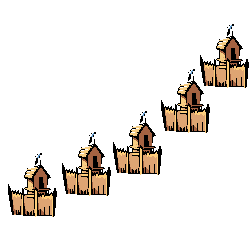 |
An American leader, Benjamin Franklin, had cautioned his colonial colleagues that they would know neither security nor freedom to surge westward into the great plains country unless France's power in America was checked. The Treaty of Paris of 1763, which ended the Seven Years' War, did just that. All threat of French intervention had been removed from the American colonies. Britain's victories freed them for the first time in their history from fear of attack by French forces and their Aboriginal allies. In so doing it also opened up opportunities for expansion into the vast west with its limitless prospect of wealth, power and prosperity.
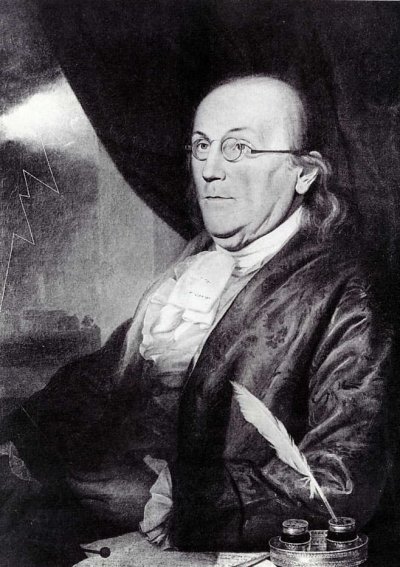 |
|
Benjamin Franklin |
It was not long before it dawned on American colonists that with the French threat eliminated, they were no longer dependent on the military might of Britain. They were geographically secure, politically mature, prosperous and dynamic. They were preoccupied with their own affairs and to the majority of the population, governors and government were an irritating interference. The debt-ridden mother country now had little to offer its self-reliant colonies. Britain's troops were no longer needed. In fact, the presence in their midst of red-coated regulars had become a burden rather than a benefit.
Thomas Hutchinson, the last royal governor of Massachusetts, recognized this dilemma in 1773. "Before the peace of 1763 I thought nothing so much to be desired as the capture of Canada by Britain. I am now convinced that if it had remained in French hands none of the colonial spirit of opposition to the mother country would have appeared. The effects of the cession of Canada on British-American relations is far worse than any thing we had to fear from the French or the Indians."
From the very beginning the role of government in England's North American colonies was slight and enabling rather that retrictive and interventionist. The British government followed in the footsteps of private enterprise which bore the burdens of conquest and settlement. This was empire-building on the cheap. Following the Peace of Paris, however, the British Government embarked on a policy of imperial reorganization. Britain's cash crunch resulted in a tightening up policy. The Crown and Parliament decided it was necessary with laws and legislation the old balance of power that had earlier existed between the American colonies and the mother country. This led directly to a constitutional crisis and ultimately to the American Revolution.
Some historians believe the American Revolution was not a revolution at all but a rebellion. According to this theory, the 13 Colonies were not proposing change but simply lamenting the loss of something they had always had. The period of "salutary neglect" by the British government had given the colonies free rein and this unintentionally encouraged an independent spirit that led in the direction of self-government. British laws had been indifferently enforced in the colonies by a distant and seemingly disinterested administration. As a result of this lapse in leadership the colonies had imperceptively become capable of managing their own affairs, a satisfying and productive practice.
During this period of prolonged legislative laxity, colonists enjoyed an exceptional measure of civil liberty. Their miniature, colonial parliaments assumed some of the pomp without the pageantry of the Imperial Parliament. Over time this included the right to tax, to incur debt, to issue currency, to fix salaries and to appoint agents to represent them in their dealings with London. In a very real sense Americans were independent before their war of independence began. They enjoyed greater liberty than all Europeans and most Britons. The contest was not that Americans had to win their independence but that Britain had to restore conformity on the colonies. She had to conquer her American colonies and re-impose on them decision-making by a strong central government in London.
The Treaty of Paris, which was proclaimed on 10th of February, 1763, ended the Seven Years' War between France and Britain. In accordance with its terms, French Canada "with all its dependencies" was transferred to Britain.
 |
The war had been costly and Prime Minister George Grenville cast about for ways in which to pay off the country's crushing debt and finance the expense of defending and administering Britain's greatly enlarged empire.
Thus the government embarked on a hard-nosed policy which included exerting pressure on the colonists to contribute to the cause of the empire. Grenville's new and more directive imperial policy was to tighten the reins of control on the colonies. Since the country's debt had been incurred on behalf of the the colonies, Grenville thought it only reasonable that colonists contribute towards paying it off. They would be expected also to share the extra costs Britain had to bear for forces to guard the frontier separating the American colonies and the increasingly hostile Aboriginal peoples.
While the expense of maintaining 6000 British regulars in the colonies to guard this newly acquired territory was Grenville's first concern, Americans saw no need for these redcoats. Now that the French and the Spanish had been reduced to comparative ciphers, they believed they could defend themselves against the Aboriginals whom they outnumbered 20 to 1.
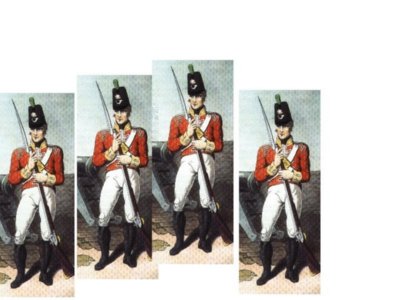 |
A frustrated Grenville cautioned the colonists that if they failed to devise their own means of "defraying the expenses of defending, protecting and securing" the expanded empire, he would be forced to impose on them some form of colonial tax. When this warning was ignored Grenville followed through on his threat and chose a stamp tax which was imposed on all legal and commercial documents, licences, newspapers, pamphlets, playing cards dice and liquor permits.
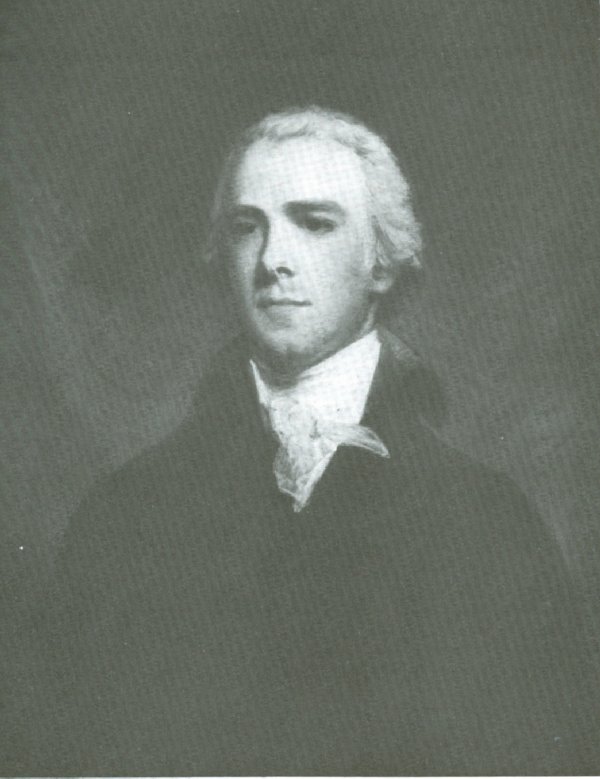 |
|
Prime Minister George Grenville |
The tax seemed reasonable enough. At the time 1.5 million inhabitants of colonial America were virtually untaxed, while eight million Britons were overburdened with a huge national debt. The Hon. Britain's finance minister, Charles Townshend, called 'Champagne Charlie' because his fondness for the bubbly, spoke in favour of the Stamp Act. "These children of our own planting nourished by our indulgence until they are grown to a good degree of strength and opulence and protected by our arms, will they grudge to contribute their mite to relieve us from the heavy load of national expense which we lie under?"
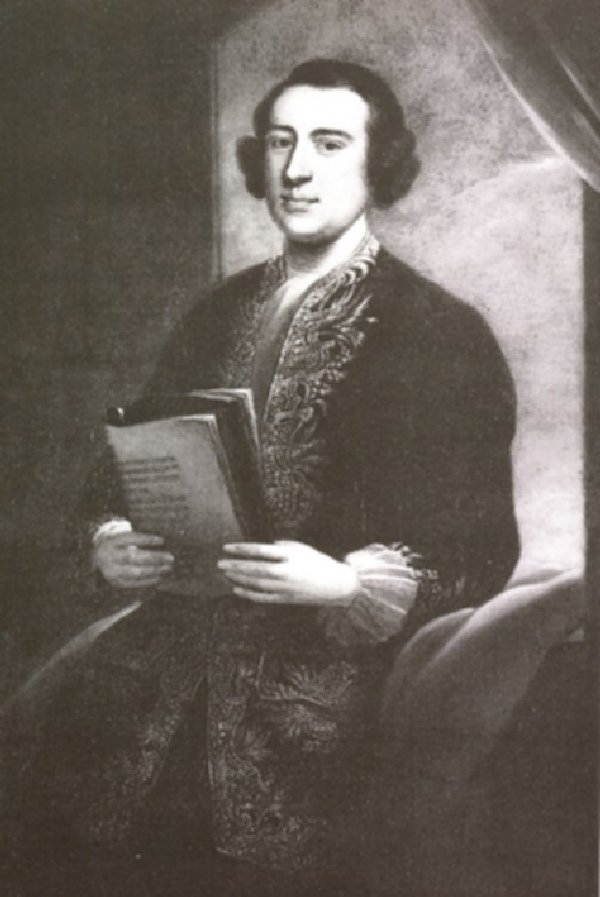 |
|
Charles Townshend |
Grudge they did. Americans begrudged any tax burden and the imposition of the Stamp Act shocked them into sedition. They now realized that the British connection was important only as long as it cost them nothing and left them free to govern themselves as they saw fit. When the House of Commons acted to legislate laws and impose taxes on them, the colonial governing classes protested that their British birthright was under siege and reacted violently to the new British taxes despite being the least-taxed people on earth.
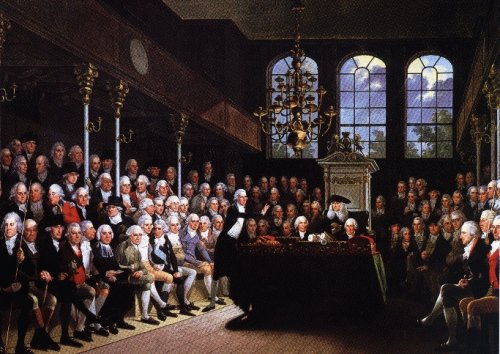 |
|||
|
House of Commons |
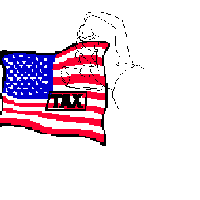 |
Colonial leaders argued that taxation without representation in the institution which levied the taxes reduced them "from the status of full subjects to the miserable condition of tributary slaves." Hypocrites were not hard to find in the colonies. Surrounded and supported on every side by black slaves, one leading American raged that white Americans should guard against Britain's seditious attempt to tax Americans. "Stay vigilant," he warned. "against that ugly hag, Slavery, the deformed child of Satan." One Jonathon Mayhew, described as a political preacher, warned that the Stamp Act was like manacles placed on men destined for slavery. Mayhew sought public support by posing as a simple yeoman, all too conscious of his defects, but loud in lauding one thing in life,"the love of liberty and humanity."
Colonial resistance to taxation from London was met with what became a popular cry of protest,"No taxation without representation." Regardless of this oft repeated rallying cry, colonial representation in the British parliament was never considered a serious solution to the colony-mother country conflict. The House of Assembly in both South Carolina and Virginia even went on record as being strongly opposed to the very idea.
Americans resisted British interference in their affairs simply because they resented being taxed. As John Adams candidly confessed,
In His Own Words
"America is not used to great taxes and the people here are not yet disciplined to such enormous taxation as in England."
Furthermore they had no intention of becoming disciplined to it. American resistance to and protests about the Stamp Act had the desired effect and it was repealed after one year in 1766.
Repeal of the Stamp Act was greeted with joy by the Americans and angry frustration by George III who was determined that the Americans would be made to pay their share of Britain's debts. New duties were resolutely imposed and just as resolutely opposed.
When British troops were stationed in the town to maintain law and order, Americans viewed their presence as a threat to their liberties. To them the redcoats represented an army of occupation, an enemy force prepared at any moment to put them down with fire and sword. Given the colonial traditions of self-government that had developed over some one-hundred and fifty years, Americans were unwilling to begin to give blind political obedience to the dictates of the distant British government across the great divide.
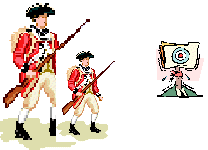 |
Tensions were always high between the "bloody backs" and the Sons of Liberty and in March, 1770, they clashed on the streets of Boston. A group of soldiers were being taunted and terrorized by an angry crowd, when someone yelled, "Fire." When the shooting stopped and the smoke cleared, three of the colonists lay dead and several others were wounded. The soldiers were later brought to trial and John Adams and Josiah Quincy successfully defended them. The victory was not sweet, however, for the Sons and the inflammatory engraving by Paul Revere, aroused and helped poison popular sentiment against the redcoats. It festered and helped foster a revolution.
 |
|
Boston 'Massacre' |
Colonists loved their tea and for some time had been smuggling it into the colony at little cost from Holland. When the inept and corrupt East India Tea Company accumulated a great surplus of tea, the British goverment decided to add a small duty to it and sell it to the colonists for less than the cost of their smuggled tea. Angry importers of the smuggled tea, joined forces with the always rabidly ready Sons of Liberty, and together foil the diabolical plan to foist cheap tea on them. Deciding to make Mohawks the culprits, the Sons painted and feathered themselves and boarded the boats to toss the tea into Boston harbour. Enraged by the rascals in riotous Boston, called by a London newspaper, "the canker worm in the heart of America." parliament closed the port until damages were paid for the tea, changed the seat of the colony's government from Boston to Salem and passed the first of a series of acts called by the colonists the "Intolerable" or "Coercive" Acts. The date: 1 June 1774.
.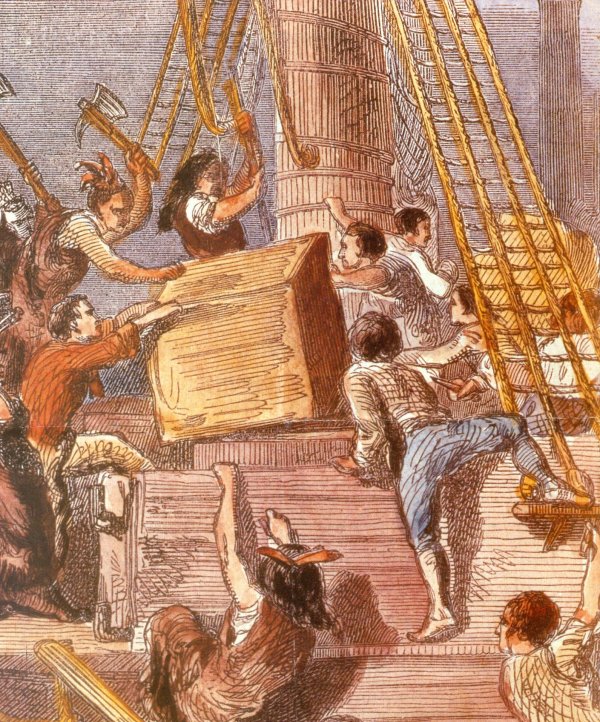 |
|
Tumultuous Tea Party in Boston Harbour |
 |
|
Tea-Tossing Tumult |
Colonial leaders believed the colonies had always been autonomous and it was their right as Englishmen to continue to be so. "Britain was about to take an axe to their liberty tree and they were not prepared to stand by and shout 'timber.'" Americans thought of themselves as conservatives fighting against the tyrannical impositions of Parliament to preserve a way of life they had always known. By opposing Parliament's pressures, they were not breaking new political ground. They were seeking rather to safeguard their societies. The colonies were loyal to the Crown and proclaimed that they were prepared to give "all due subordination to Parliament," but they refused to pay taxes without their public's consent. The fractious colonies decided that they now had a common cause that called for action.
Several leaders including Washington, Jefferson, Patrick Henry and others, put together 24 Resolves, one of which threatened force if King George went so far as to "reduce his faithful subjects in America to a state of desperation." Pubic opinion differed, as John Adams noted in his diary."The ideas of the people are as various as their faces." One thing they did agree on was the necessity of convening a congress to take up the grievances and decide what to do about them. They decided to meet annually in general congress "to deliberate on those general measures which the united interests of Americans may from time to time require."In mid-June 1774 a decision was made to hold a proposed congress in Philadelphia on September 1st. The First Continental Congress conprising fifty-six of the leading men of all the colonies except Georgia, convened a brief but momentous meeting on Monday, September 5, 1774 in Philadelphia at Carpenters' Hall, a modest structure, little larger than a local city tavern. The great question that confronted the delegates was to what extent were they willing to break the bonds with Britain.
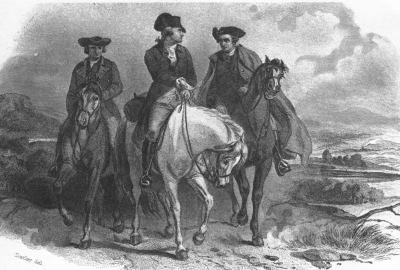 |
|
Delegates travelling to Philadelphia for the 1st Continental Congress |
Delegates to this First Continental Congress, convened to protest a growing list of colonial grievances, were greeted upon their arrival in Philadelphia "by bells ringing, cannons firing and men, women and children crowding as if to a coronation." The Congress delegates, who made up a fair cross section of the most eminent and representative colonial figures, had no constitutional authority to legislate or to govern. After a searching debate, they passed resolutions to be sent to Parliament. Laying formality aside, they made a direct appeal to "all true and kindly people of Great Britain, who have been led to greatness by the hand of liberty. The people of America pray for permission to share their freedom."
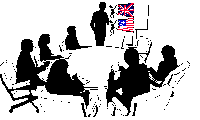 |
Before adjourning on Wednesday, October 26,1774, members of the First Congress passed a resolution rejecting revolt. They made no appeal for independence, but did petition for "relief from oppression" and a return to the relationship they had enjoyed with the mother country in the years prior to 1763. In their final act, they directed an appeal to King George in which they said they had been compelled, "by force of accumulated injuries too severe to be any longer tolerable, to disturb your Majesty's repose by our complaints."
They assailed the Quebec Act of 1774, which extended the Province of Quebec to the Ohio River on the south and the Mississippi on the west. As extended, it frustrated their eagerly anticipated flow into this western wilderness from Connecticutt, Massachusetts and Virginia, fertile lands at which they looked longingly for future growth and development. At their concluding dinner, a final toast was proposed that some described as a prayer. " May the sword of the parent never be stained with the blood of her children." Canadian colonies and the Floridas were invited to send representatives to the next meeting, the Second Continental Congress which was to be convened on Friday, May 5, 1775.
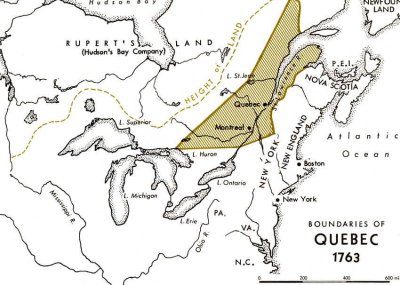 |
|
Proclamation of 1763 |
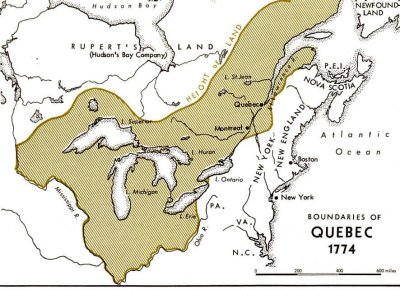 |
|
Quebec Act 1774 |
One delegate blamed "the cursed schemes of British policy for dragging friends and brothers into the horrors of civil war and involving their country in ruin." Follwoing their approval of a Declaration of Rights, the members of the First Congress dissolved themselves, after resolving to meet again on Wednesday the 10th of May, if their grievances were not redressed by George III.
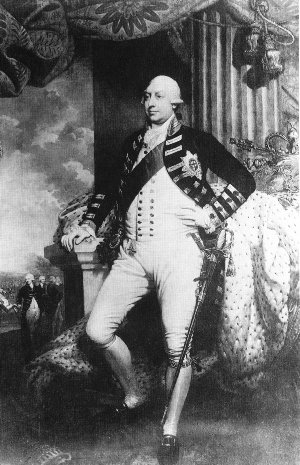 |
|
George III |
Proud and disdainful George III did not take kindly to this passionate appeal. He was interested neither in the complaints, compromises nor the compliments his petitioners proffered. Reason was not a pronounced aspect of his character and he showed little understanding and less interest in the significance of what had happened in Philadelphia. "The New England governments," he informed Prime Minister North,"are in a State of Rebellion. Blows must decide whether they are to be subject to this country or independent." A compliant prime minister and Parliament believed the bombast.
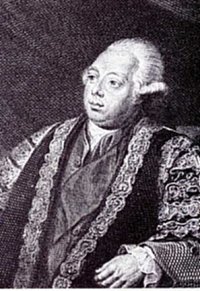 |
|
Lord North |
In truth the Americans were neither economically nor politically oppressed. They were simply not prepared to pay even a paltry tax if it were imposed by the mother country. In the words of one writer the conflict was "not about home rule but about who would rule at home." Americans felt Parliament was threatening their right of self-determination and because Parliament was not part of their "chain of command," they were determined to resist its dictates. Since they were protesting change and not promoting it, opposition to this outside interference was considered reactionary not revolutionary. Americans still considered themselves English but argued that their colonial requirements and preferences were not always identical with those of the mother country. This difference had to be respected.
The British Empire functioned on an economic system known as mercantilism which was based on the principle that the colonies existed for the well being of the mother country. They furnished raw materials from which England produced goods which were then sold to the colonies. These mercantilist principles were applied to the British Colonies through a series of Trade and Navigation Acts passed by Parliament. The acts included three major provisions.
(1)All trade between Britain and her colonies had to be carried in British ships.
(2) All European goods imported into the colonies had to pass through Britain which benefitted English businesses.
(3)Certain articles produced by the colonies (primarily tobacco at first, but later practically every product) had first to be shipped to Britain or to British colonies even when the goods were for resale in other European countries.
 |
By and large the American colonies benefited from the economic system. When regulations and red tape created a problem for them, they quickly found ways of getting around the objectionable provision. As long as the laws were loosely enforced by Britain the colonies had little about which to complain. However, when Britain began to tighten things up and strictly enforce compliance with the regulations, clear differences between the colonial conception of federalism and England's concepts of empire came into conflict.
Three thousand miles of ocean separated America from England and interval and distance muted the message from the mother country. This vast sweep was cited by the colonies as a very valid reason to resist intervention from across the sea. It was unthinkable to be forced to regulate their lives by decisions made 3000 miles away. A request and the response might easily take six months when immediate action was often required that could not wait upon a distant decision. This was especially true when those who were to make the ruling were ignorant of any fast-breaking facts.
The Americans declared that the great watery wall made them immune from overseas' orders. Thomas Paine put it this way in his very popular publication Common Sense. "Even the distance at which the Almighty has placed England and America is strong and natural proof that the authority of the one over the other was never the design of heaven."
The British government simply failed to recognize how independent in attitude and actions the 13 Colonies had become and how sensitive some colonials now were to London's long reach. The turmoil that was about to take place resulted from colonial self-interest, a fact simply not treated seriously enough by the British government until it was too late. Britain failed to understand the gravity of the challenge to their civilian authority. This authority represented by the glove on the mailed fist of military might was stripped away. While once an intimidating prospect, the might of the mailed fist had lost its faculty to overawe the colonials. In the early stages of the revolution it lost its leverage because of the poor performance of the redcoats. Its failure to overawe the dissaffected served to embolden the Americans and made a trial of strength inevitable.
Almost everyone in Britain including those sympathetic to the American cause believed that the British Empire and Britain were indivisible. Parliament which served all was supreme and the only possible concept of empire was the old mercantilist one. Based on this belief the Americans were either loyal British subjects in the British nation or they were not. There could be no in between. Colonies which refused to accept the full extent of parliamentary supremacy were not merely worthless, they were dangerous. An empire out of control was worse than no empire at all.
The American Rebels/Patriots were advocating a new, rebellious, dangerous revolutionary doctrine which if successful would destroy the wholeness of the Empire they were sworn to preserve and defend. Parliament had to be supreme over all parts of the empire in order to knit the mother country and all her colonies together "in one Grand, Firm, and Compact Body." The argument became a contest which developed into a conflict.
To British and American Tories/Loyalists there was really no alternative to the existing system. Loyalists pamphleteers warned it was either reconciliation or ruination. Loyalists believed that if Americans went to war with Great Britain they would be ravaged by it and beaten. The rebels would then be worse off than before because they would be treated like the traitors they were instead of as Englishmen. Most Loyalists believed that even if America won the war - which they never for a moment expected - they would still be doomed. A republican form of government such as had existed in Rome would be prone to civil war and most likely lead to rule by a despot. An independent America would be ravaged by civil war, its people would be oppressed and its harbors open to attack by marauding maritime nations. The best solution by far was reconciliation with Britain, not blind capitulation but with conditions clearly spelled out in a new constitution. Such an agreement could solve the problem of taxes for the colonists and at the same time establish parliamentary authority.
The protesting Americans considered themselves Englishmen who were struggling to preserve the long-established rights to the only way of life they had ever known. Taxation without representation was tyranny. They had no intention of becoming "a cash cow" or "a revenue mine"for Britain. In the words which John Jay addressed to the British public: "We will never submit to be hewers of wood or drawers of water for any ministry or nation in the world."
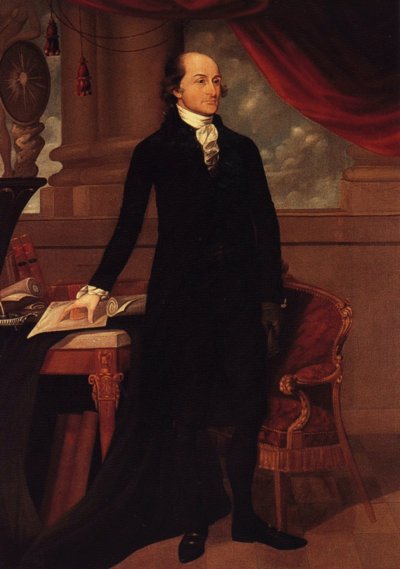 |
|
John Jay |
This determined colonial conviction began to breed discontent and mistrust which in turn led to protests that produced first a mob and then a militia intended not so much to tear down a tyranny as to protect existing turf. The cessation of the Seven Years' War became the curtain raiser for the commencement of another conflict - the American revolution. As in France in 1789 and Russia in 1917 the American Revolution was not even remotely the act of a united people but the work of a substantial number of activists who set out to persuade or coerce the rest of their countrymen and women into thinking as they did. They succeeded beyond their wildest imagination.
The colonists managed to set aside their provincial, religious and social divisions so that, as John Adams put it, "thirteen clocks were made to strike together." They made self-government, religious freedom, economic opportunity and territorial growth inseparable.
When Canadians spurned the invitation to join the rebels in their revolt, it was decided that Canada would have to be taken by the sword. The second Continental Congress voted on Tuesday 27 June 1775 to invade and conquer Canada and make it the 14 Colony. At first the odds in favour of an American conquest seemed overwhelming. The 13 Colonies had a population of about 2.5 million, while Canada had scarcely 100,000 most of whom were French whose involuntary attachment to the British Crown dated back only a dozen years. Now was the time for the habitants to act. If with their assistance, the Americans could seize Canada and win their own independence, they would make themselves master of most of North America at least stretching as far west as the Mississippi River.
Their eventual mastery of North America would be aided and abetted by Americans' belief that their riflemen were the world's best marksmen. This certainty runs through America's military history, dating at least to the American War of Independence, (1775-83) when sharpshooters born and bred on the frontier, killed a disproportionate number of British officers. Their long shots were effective. Their deliberate targeting was nonetheless deplored by the British army, whose soldiers armed with muskets, advanced in formation in full sight of the enemy who picked them off at will like, bragged one colonial, "fish in a barrel."
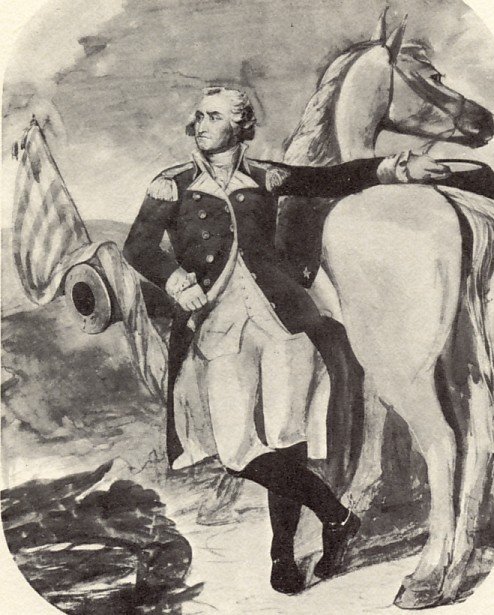 |
|
A Jaunty George Washington |
George Washington was of two minds about the tactic. He expected his riflemen to "skulk" in the Indian manner, but cautioned that if any other kind of soldier "shall attempt to skulk, hide himself or retreat from the enemy without orders of his commanding officer, he will instantly be shot down as an example of cowardice." By the mid-19th century, American riflemen, whether hidden or not, were internationally famed as crack shots. As Alexander Rose, a military historian, shows in his rigorous account, this reputation had sound statistical support. An infantryman on the Unionist side in the American civil war (1861-65) was, on his reckoning, five times as good at hitting his foe as his Mexican, British or Continental European counterpart.
General George Washington had a a tendency to regard each engagement as a personal challenge. He even envisioned a night attack across the ice with advanced units wearing ice skates. In May 1775 a force of Green Mountain Boys from New Hampshire surprised and captured Ticonderoga and Crown Point. Washington chose a young colonel named Benedict Arnold to undertake the route up the Kennebec River into Canada. To join him a thousand men from the ranks longing for action volunteered at once. Led by this aggressive Connecticut colonel, they were to advance on Quebec across the Maine wilderness taking a northeastern route up the Kennebec River. This was a hastily conceived 'secret expedition' based on too little knowledge of the terrain. In small units the men began marching off for Newburyport north of Boston from where they would sail by sloop and schooner to the mouth of the Kennebec.
Benedict Arnold was a prominent trader and merchant who made his fortune sailing goods from the West Indies to New York, Boston, Montreal and Quebec. Energetic and often impetuous, he had graying hair by 1775 which gave him an air of maturity, but at 34 he was a man of unusual strength and agility. Of average height for his time, his steel eyes, prominent nose and tendency to speak in a crisp and succinct manner gave those he encountered cause to grant him instant respect. Despite making himself one of the wealthiest men in the colony of Connecticut, Arnold welcomed the break between King and the colonies and was anxious to participate personally in any war even at the risk of his fortune.
Washington told Arnold, "I need not mention to you the great importance of Quebec and the consequent possession of all Canada in the scale of American affairs. To whomsoever it belongs in their favour probably will the balance turn." By capturing Quebec the Americans would "restore the only link wanting in the great chain of Continental union." Washington believed at this time that patriotic fervour combined with sheer courage could defeat the odds and the elements.
Brigadier General Richard Montgomery with a force of some 2000 colonial troops successfully attacked Fort Chambly and St.Johns as a result of which Sir Guy Carleton was forced to evacuate Montreal and fall back to Quebec to await the arrival of reinforcements. The Americans had decided on a two-pronged attack. Arnold was to meet up with Montgomery whose forces were coming down the St. Lawrence in ships captured when Montreal capitulated without a struggle. The next assault was to be a surprise attack on Quebec.
 |
|
Sir Guy Carleton |
Montgomery, was to lead the attack. Believing Carleton with only a few British troops might decide it useless to attempt to defend Quebec, Montgomery called on him to surrender. Receiving no reply Montgomery prepared to attack. His forces were located on the Plains of Abraham, while Arnold's were on the low grounds by the River St. Charles north of the city. Together they began to invest the city. While Carelton could expect no assistance from the French peasantry and no new supplies would be forthcoming because of the ice-choked river, he was better off than Montgomery. The latter's troops were nearing the end of the term of their enlistment, they were unseasoned, exposed to the elements and subjected to ever-increasing hardships. Without artillery to bombard the Citadel but pressed to act, Montgomery decided upon a frontal attack.
Carleton, a tall, cold, aloof individual, was said by one of his officers to be "one of the most distant, reserved men in the world. He has a rigid strictness in his manner very unpleasing and which he observes even to his most particular friends and acquaintances." James Wolfe, a very close friend and hardly a model of good humour and high spirits himself, described him as, "grave Carleton." At fifty years of age, Carleton was a model of an 18th century British officer - conservative, stiff-necked and uncompromising, he was also active, energetic and honest. King George III once wrote that Carleton's "uncorruptness is universally acknowledged." A soldier under his command at Quebec said, " There in not, perhaps, in the world a more experienced or more determined officer than General Carleton." Montgomery was up against a formiddle opponent.
Time was of the essence because the Americans knew Quebec had to be taken before British reinforcements arrived in the spring. Despite the difficulties he faced, Montgomery was certain of success and predicted he would eat a good Christmas dinner within the Citadel walls. As it turned out he was forced to take his turkey elsewhere for Christmas passed and Quebec remained defiant. Montgomery's two initial assaults on the fortress of Quebec were unsuccessful.
Montgomery and Arnold wanted their next attenot bolstered by bad weather and they got more than they bargained for when a wintry blizzard engulfted them about two a.m. on December 31, 1775. Before commencing the assault, Arnold Arnold announced to his men that no soldier needed to participate who did not wish to do so. These were welcome words to a handful of men who according to a Massachusett's musketman, "had got cannon fever to such a degree that they were excused."
As the blizzard raged, the order to attack was given. With white paper bearing the words 'Liberty or Death' fastened to their hats so they could readily identify one another, they ploughed towards the lower town with snow, hail and wind whistling horizontally into their faces. "The storm," declared one rifleman, "was outrageous and the cold wind extremely biting." Snow was falling so heavily that those who followed behind as close as one hundred yards had difficulty finding the tracks of the men who had just preceded them.
They came yelling wildly out of the snow, firing all the while through the gun ports. Within the alarm was sounded, bells of the city pealed forth and British troops turned out. "A horrible roar" erupted from Quebec's cannons. From the blockhouse the British had erected, Montgomery and his men were showered with cannon shot and musket fire. One British soldier touched a match to a cannon loaded with grapeshot - small iron balls designed to shatter and rip apart enemy vessels' sails and rigging. A horrific boom and whirring sounds followed as each piece of metal struck rock, earth and flesh. Agonizing screams disclosed that the balls found their mark. Montgomery at the head fell dead, a piece of grapeshot piercing his head. Esteemed as a military leader to be reckoned with, Montgomery died before his talents as a soldier could be fully utilized by the Americans.
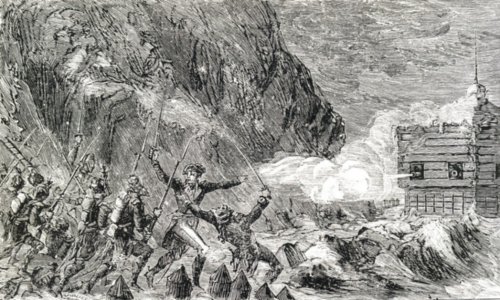 |
|
Battling the Blizzard and the Barricade. |
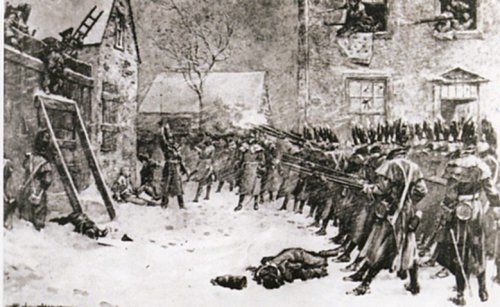 |
|
Battering the Barricades of Quebec, Dec. 31, 1775 |
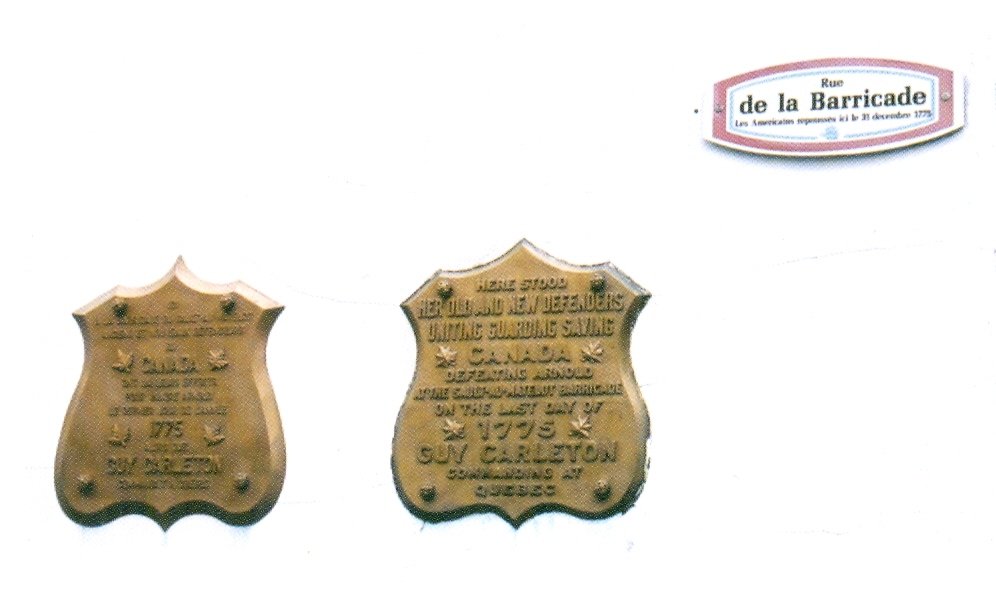 |
|
Rue de la Barracade in Quebec |
These plaques are on the wall of the very house that faced the fusillades of attacking Americans that stormy 31 December, 1775 during their failed attempt to take Quebec.
Inscribed thereon is the following.HERE STOOD
HER OLD AND NEW DEFENDERS
UNITING GUARDING SAVING
CANADA
DEFEATING ARNOLD
AT THE SAULT AU MATEUOT
BARRICADE
ON THE LAST DAY OF
1775
GUY CARLETON
COMMANDING AT
QUEBEC
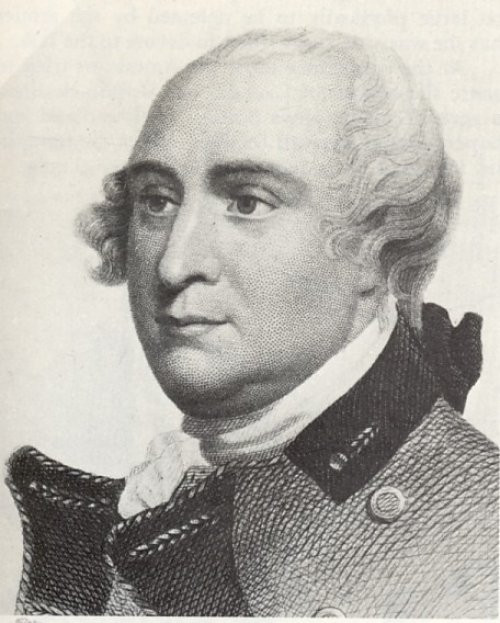 |
|
Sir Guy Carleton |
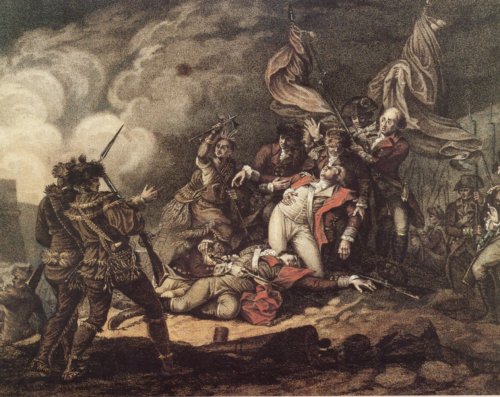 |
|
Montgomery's Death at Quebec |
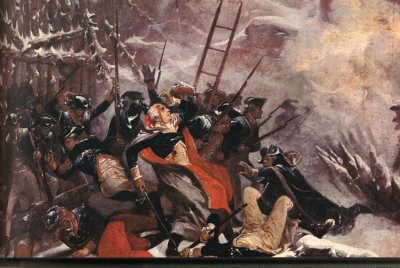 |
|
Montgomery's Dies Yet Again at Quebec |
Arnold, who was wounded in the calf of his left leg, was carried away. The attackers were devastated by the loss of their leader, but throughout the winter they continued to besiege the city without success. The first four months of 1776 were grim for the attackers. May were laid up with smallpox. All were ill equipped and ill fed - seeking to survive by eating their horses, dogs and even boiling their moccasins. They died by the score from exposure and disease. Fear and discouragement were rife and rapidly demoralized any new enlistees arrving in small groups from Montreal. They had little to do but battle the the bitter cold - falling one night to -29 Fahrenheit. Arnold might have made a difference had he been up and about, but he lay flat on his back with his wound. Finally on Monday, May 6, 1776. Carleton was faulted later for not attacking and capturing Arnold. Cutious and practical as usual, Carleton was leery about the effectiveness of his militiamen, who while worthy behind the barricades, might not fare as well in open combat. By winning he would inherit more prisoners to feed and sick and wounded men to care for. He decided not to attack Finally, On May 6 Arnold and his men met with a shocking surprise - literally. The British brig, HMS Surprise, hove into view. It was the first of the relieving British fleet, which arrived carrying 10,000 troops. Denied the prize they fully expected to win, Arnold and his sorry soldiers retreated down the Richelieu Valley, pursued by redcoated regulars. f IWashington considered Quebec the decisive blow, it was not the kind he had in mind.
History should certainly highlight the importance of the crisis Carleton managed so successfully. Had he failed in the face of the assault, British Canada might well have become the 14th Colony, the northern part of what became the new American nation.
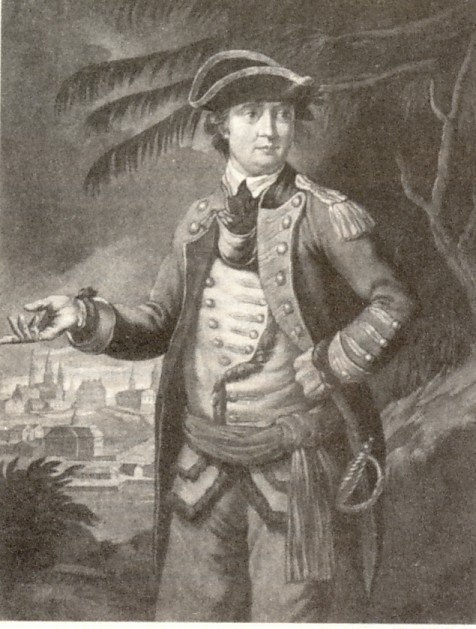 |
|
Benedict Arnold's portrait painted shortly after his ill-fated assault on Quebec depicted in the background. |
Guy Carleton, the British governor of Quebec who had conducted its heroic defence, was knighted for his success. He was, however, chastised for not pursuing the fleeing American army and capturing Arnold who was considered by British officials as an important opponent. Carleton's seeming reluctance to press home an apparent advantage and destroy the American army was considered "extraordinary conduct" and raised questions about his motives for not doing so. This conduct and his "uncommon solicitude" shown the American prisoners was thought by some to demonstrate the clemency the rebels might expect if they would only come to their senses. Some thought Carleton's failure to act while the Americans were scrambling to get out of the country "ruined the British campaign of 1776 and possibly altered the outcome of the war." The task had now to be taken up by Gentleman Johnny Burgoyne, a man of many talents. Thought of by some as a butterfly and a wit, who even in that gambling age, was remarkable for his reckless manner.
Copyright © 2013 Website Administrator